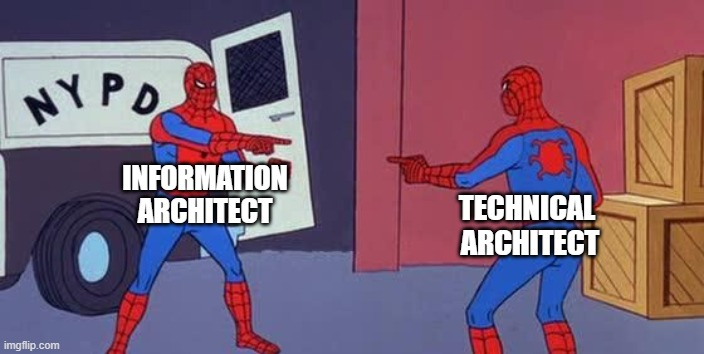Technical architects and IAs
When I started at Microsoft, I made friends with a technical architect for the first time, when we spotted each other doing the same work.
 We had arrived at this work in opposite ways, because of the inverse ways that IA and technical architects are trained and developed.
We had arrived at this work in opposite ways, because of the inverse ways that IA and technical architects are trained and developed.
You learn theory while getting a computer science degree, but my understanding is that little of the education focuses on architectural principles. Instead, you get a job and are assigned a small scope as a junior developer: a small feature, or part of a larger one. As you gain experience and move up, you get a larger and larger remit, until eventually someone puts you in charge of making decisions about the whole system, and you’re made a technical architect –often with no explicit training in how architecture works. Instead, you learn it on the job from your own successes and failures, you read what other architects have written and complained about, and gradually assemble your own theory, organized around your practical experience.
Conversely, you do learn IA in school.1 1 I know this isn’t universal, many of the best IAs I know sort of tripped into the work from other fields at some point in the past. But a lot of us who ended up in the field semi-accidentally are now teaching IA to early- or pre-career people who are asking how to get entry-level jobs in IA, which might be an oxymoron. You read Buckland and Bates, learn to create classification systems and models of information behavior, and you come out with the theoretical tools to make massive changes to a system. If you’re very lucky, you get hired somewhere to “fix the IA,” but the people hiring you very rarely realize what they’re asking for. Driving the kind of widescale organizational change requires political skills and leverage that no one has at that stage in their career. So instead, you spend years working up to a position where you can implement solutions to the problems you saw from the beginning. You gradually assemble a working practice around the theory you started with.
Notes mentioning this note
There are no notes linking to this note.